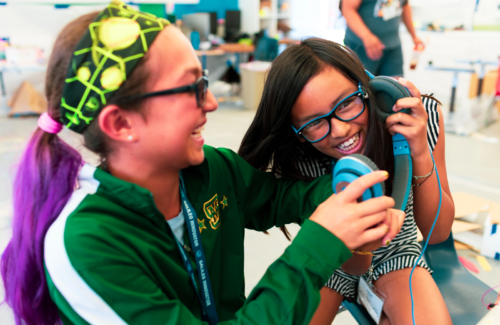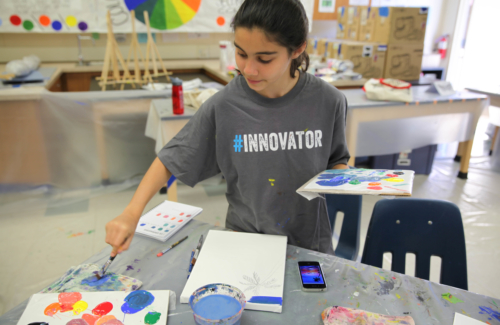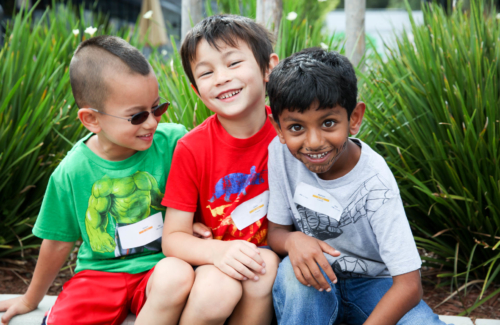Getting Kids to Talk (And Keep Talking) About Their School Day

A new school year is underway—new grade, new teachers, new kids, new things to learn… and a lot of new questions you’re dying for your kids to answer: Are they learning? Do they have friends? Are they happy? Is there anything in particular happening during all those away-from-home hours you should know about?
From schoolwork to social dynamics, your kids are navigating a lot of complicated intellectual and emotional stuff throughout their school day. And unfortunately, parents are often the last people to hear about it. So how do you get your kids to really, truly talk to you about their day? Here are some simple strategies to shed some light on their lives at school.
HOW TO ASK THE RIGHT QUESTIONS
The usual after-school questions tend to result in the usual (which is to say totally unsatisfying) answers: “How was your day?” “Good.” “What did you do at school?” “You know, the same stuff.” Every conversation starter seems to lead to another frustrating, non-answer dead end.
So instead, take a step back and figure out what you really want to find out when you ask about school. Do you want to know what they’re learning? Who they’re hanging out with? How they’re feeling? Decide what you’re interested in, then tailor your questions accordingly. Here are some specific questions you can try in a few different areas (with thanks to Liz Evans and her excellent list in HuffPost for a few of them).
After-School Questions That Get You Real AnswersAre they learning? What are they interested in?
Do they have a good relationship with their teacher?
Are there areas where they feel overwhelmed or need extra support?
How are they doing socially?
Are they happy?
|
|---|
Whatever questions you choose, just remember that the more specific you are in asking, the more specific they’ll be in answering.
TIPS FOR GETTING THE FINER DETAILS ABOUT SCHOOL
If you want deep information on school, you may need to do a little legwork of your own. Here’s how to get some of the finer details you may be looking for.
Find out what’s on your kid’s schedule.
If their school sends home a calendar, a newsletter, a weekly folder or a link to a class website (or even a cafeteria menu), read it! Find out what topics they’re covering in their classes. Learn the names of their teachers and classmates. The more you know about what they’re working on, and with whom, the more specific questions you can ask. “Tell me about the speaker who came to your class today. What did you like most that he/she talked about?” “I see you’re studying long division this week. On a scale of 1-10 with 1 being ‘it’s a breeze’ to 10 being ‘it’s super complicated’ how would you rank it?”
Set the stage before school.
This can be an especially good strategy for focusing little ones. Before your kids leave for school, say something like, “I want you to tell me two fun things that happen at school today. Think about them during the day, because I’ll ask you when you get home.” Sprinkle in any specifics you know from reading their school materials: “I want to hear all about your science experiment/history project/burrito lunch.”
Follow up after.
Make good on your before-school promise and ask your kids what you told them you would. If all goes well, they’ll be so ready you may not even need to prompt! Keep the conversation going using what you know about their schedule, asking, for example, what happened next to a character in a story they’re reading or whether their tomato plant grew.
HOW TO CREATE NATURAL, ONGOING CONVERSATION
Ideally conversations with our kids would feel more like a casual chat than an interrogation. Here are a few strategies for making that happen.
Do a goal-setting activity.
A great way to make school an ongoing conversation is through goal setting. Show kids they have agency in all aspects of their school lives by helping them set goals with regard to their classes, their friends, their extracurriculars or anything else. Ask them where they are now, what they’d like to accomplish by the end of the school year and what steps they can take to get there. Join in by setting goals for yourself and for the whole family to achieve together.
Make your goals visual and interactive.
There are lots of fun ways to do this—calendars, vision boards, goal ladders. Check out Big Life Journal for some great ones. The most important thing is to make your kids active participants in the process, engaged and excited because they’ve identified their own goals and strategies for achieving them. Not only will goal setting give you plenty to talk about as you check in on your progress, it’s also a valuable skill that will serve your kids throughout their lives, both in and out of school.
Create a ritual (and make time to do it).
Getting your kids to talk about their day isn’t a one-size-fits-all proposition. Every family has different dynamics, schedules and communication styles, and you need to find what works best for you. What’s important is simply that you find a comfortable way to share daily events. These rituals are more effective at bringing out natural dialog when parents participate too, modeling the type of conversation they’d like to hear from kids.
Family Rituals That Spark Conversation
|
|---|
Once you find a way to share that works for your family, make it part of your daily routine. Whether it’s in the car on the way home from school, around the dinner table, over breakfast or at bedtime (when kids are often looking for ways to stall anyway), make it a ritual that kids expect every day, so they’re ready and willing to share.
Make space with one-on-ones and downtime.
Sometimes kids simply need a little time and space to open up about what’s going on in their lives. Make sure they get it. Schedule some one-on-one time with each of your kids once a month or once a quarter. Whether it’s as simple as taking them out to ice cream or as grand as going on a trip, setting aside that time lets them know they have your full attention if there’s anything they want to talk about. Another space-making approach is this one from Simplicity Parenting: Make sure your kids have some downtime in their days when they’re not at school, at an activity, having a playdate or doing homework. These “moments of pause,” where everyone is just hanging out without an agenda, can provide safe spaces for kids to share without prompting.
SHOW ‘EM HOW IT’S DONE
Like anything else in parenting, modeling the behavior you want to see goes a long way. If you’re honest and descriptive when you share about your day—the good and the bad—your kids will follow suit.
Jim Fay, co-founder of Love & Logic, explains it beautifully here: “Just start talking about your day: ‘I hope you had a great day. Guess what I did today? I read this great article; I saw this thing on the Internet.’ Talk with a lot of enthusiasm about what you did. They’ll join in after a while. The things we learned the best and built into our subconscious aren’t what our parents told us; they’re what we saw our parents doing.”
ABOVE ALL, LISTEN
It’s natural for these kinds of conversations to get swallowed up by the busiest parts of the day, when everyone’s arriving home and getting settled in. It’s easy to ask how-was-the-day questions when we’re busy doing something else and only half-listening, or to jump in too quickly with questions or advice.
Remember in these moments, when you’re trying to connect with your kids and find out what’s really going on with them, that listening without haste or judgment is what makes this communication possible. It’s not an inquisition or a task to check off your list. It’s a chance to hear some real talk from your often mysterious, always fascinating kids.
Written by: Pamela Briskman, Galileo Vice President of Curriculum, Julie Eglington, & Ileana Street

 3 Top Strategies to Develop Critical Thinking in Kids
3 Top Strategies to Develop Critical Thinking in Kids  3 Strategies To Help Middle Schoolers Build Innovation Skills
3 Strategies To Help Middle Schoolers Build Innovation Skills  3 Ways To Build Up Resilient Kids Who Are Prepared For Everything Life Throws At Them
3 Ways To Build Up Resilient Kids Who Are Prepared For Everything Life Throws At Them 